Future City of Tomorrow To Be Powered by Smart Technology
Table of contents

We recently told you about the building boom behind spaceports, where sci-fi visions of high-tech rocket bases straight out of Star Wars are overlaid on existing airports or old industrial sites. Most of the “boom” is still on paper only, with spiffy illustrations of spaceports inked by artists likely taking a break from drawing oversexed warrior maidens for graphic novels. Let’s face it: Any self-respecting future city of tomorrow will need a spaceport, as part of its overall strategy of applying smart technologies and other innovations like flying cars to make the lives of its citizens better – or at least look cooler.
What is a Smart City?
We’ve profiled so-called smart city technologies before, especially for applications in transportation. While there’s not one official definition for the term “smart city,” we’ll defer to the bright minds of CB Insights with this concise explanation:
A city is considered to be ‘smart’ when it can collect and analyze mass quantities of data from a wide variety of industries, from urban planning to garbage collection. In a smart city, a complex network of interconnected sensors, devices, and software must be built and maintained.
About two-thirds of cities are investing in some sort of smart city technology, according to the National League of Cities. About a quarter of those cities still living in the Dark Ages are thinking about hiring some overpriced consultants to help them implement smart technology.
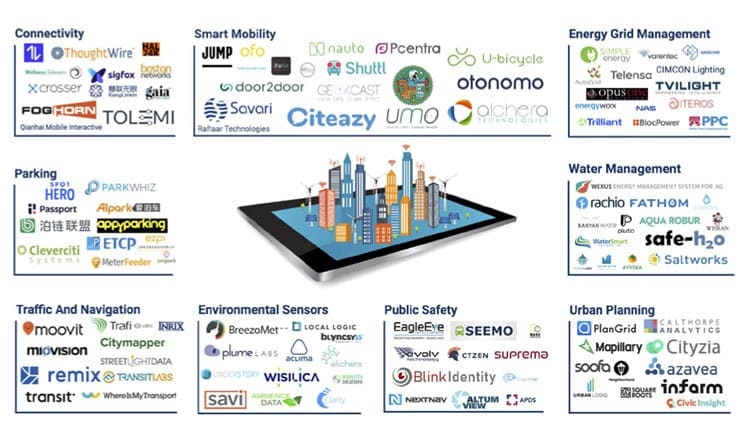
This seems to be a particularly good time to dive back into the topic, as the looming introduction of 5G is expected to help connect smart cities like never before. Add in the power of artificial intelligence to analyze and detect patterns in all of that incoming data from sensors and devices, and we can start to see the future city of tomorrow beginning to take shape. Below we profile some of the key technological sectors of the smart city and a few recently funded startups behind them.
Smart City Management
Cities are complex organisms, with many moving parts. The person usually tasked with the day-to-day operations of overseeing the unruly beast is the city manager, a position with an average salary of more than $95,000. Sounds like a white-collar job just waiting to be replaced by artificial intelligence. Enter Atlantis, an AI-driven platform from San Francisco-based startup Quantela, which was founded in 2010. The company recently hauled in $10 million on a Series A round in November. Quantela bills Atlantis as a platform for “smarter urban infrastructure utilization decisions.”
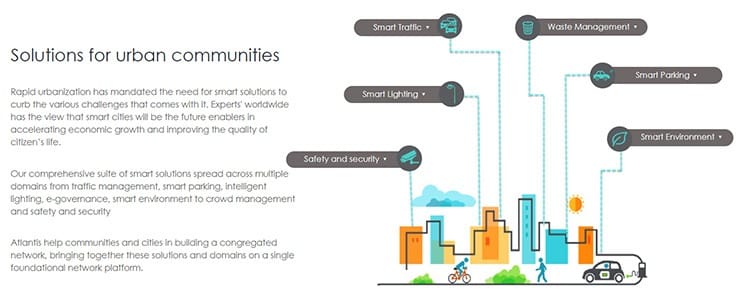
Atlantis aggregates and integrates both historical and real-time data from millions of sensors and Internet of Things (IoT) devices. It then applies machine learning to help humans make better decisions about how to run their cities. For example, it can suggest the optimal time to schedule trash pickup in a neighborhood based on traffic patterns or even predict areas where pollution may be particularly bad. At least that’s what all the flashy, buzzword-filled marketing says. Still, the company claims offices in India, Europe, and the United States. It also recently entered into a partnership with the University of California, Berkeley, to incubate smart city startups by providing access to Atlantis.
Smart Mobility
We’ve often heard that the average commuter spends 42 hours a year stuck in traffic. While 42 might be the answer to the universe, that’s still a lot of time that could be better spent honing your esports skills. Fixing traffic congestion might just be job No. 1 when it comes to building the smart cities of the future. That’s why we see so much money being poured into technologies such as self-driving cars, electric scooters, and delivery robots.
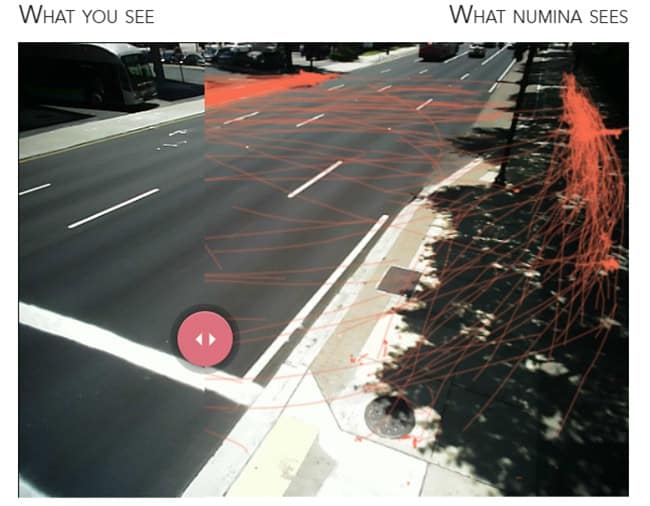
New York-based Numina – which claims support from a number of well-known accelerators and foundations, including the Clinton Foundation, as well as BMW – is all about driving less. Toward that goal, the startup has developed a sensor platform, mounted to street infrastructure such as light poles, that uses computer vision to measure how people and objects move throughout streets and public spaces. Numina’s platform counts each type of traveler or object, as well as their speeds, paths, directionality, proximities to one another, time spent in key locations, and more. City governments can then take that information to help unlock gridlock or improve bicycle networks, for example.
Smart Road Repair
All of the traffic rumbling through our cities takes a toll on our roads. That’s where an extra pair of computer-enhanced eyes can make a difference. Founded in 2016, Pittsburgh-based RoadBotics is a spin-off out of Carnegie Mellon University, one of the epicenters for artificial intelligence research in the world. The startup has raised $3.9 million in disclosed funding, with the most recent investment coming just last month. RoadBotics uses machine vision to identify structural problems in roads, such as cracks and potholes. Drivers use smartphone cameras mounted on a car’s windshield, while algorithms map out the flaws on a color-coded scale.
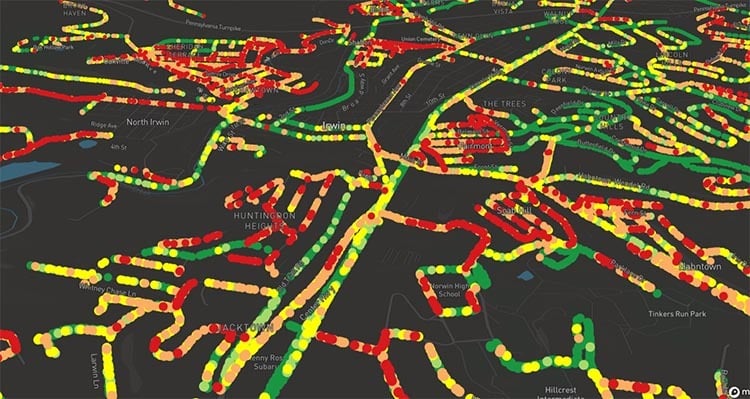
Prices vary based on the miles of roadway to be mapped, but any project of 50 miles or less is a flat $5,000. (Angry city resident: Why can’t we fix the roads? City official: We spent all the money on mapping out how bad they are.) We wonder if RoadBotics has considered leveraging its data to the startups creating high-definition maps for autonomous vehicles.
Smart Parking
Future city technologies will not only improve transportation but help with a closely related problem that most of us encounter in the middle of just about any big city – parking. In fact, investors poured more than $800 million over more than 80 deals into parking startups last year, though this year it looks as if that trend has dropped sharply:
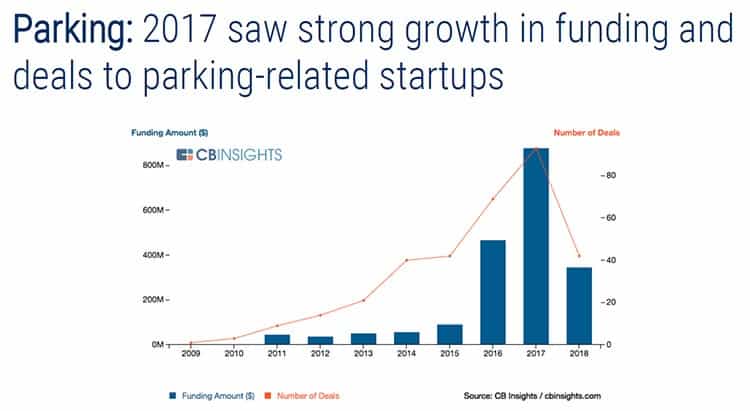
We introduced you to a half-dozen smart parking startups a couple of years ago, but more and more companies are joining the race to the best parking space all the time. Four-year-old SpotAngels out of San Francisco has taken in $4.4 million, including $2.3 million in July from a roster of investors led by Google Maps co-founder Lars Rasmussen, among others. The founders started the company after getting towed and hit with a steep fine in order to get their vehicle back. Billed as the Waze of parking, the crowdsourced app shows users all the parking options around, remembers your parking location and sends reminders to make sure you won’t get a ticket or be towed.
The app connects to a car’s Bluetooth or user’s smartphone to track when a vehicle is parked or on the move. It is free to use, as SpotAngels makes its money by licensing its parking maps to car companies.
Smart Lighting
One of the biggest expenses for any city, aside from retired bureaucrats with outsized pension benefits, is energy. That’s one reason why we’re seeing a renewed interest in nuclear technology and a bigger role for AI in managing alternative energy like solar and wind. One utility that eats a big chunk of a city’s budget is street lighting. In response, a number of companies offer smart streetlights, including a UK outfit called Telensa that has raised $18 million so far for its smart streetlight system.
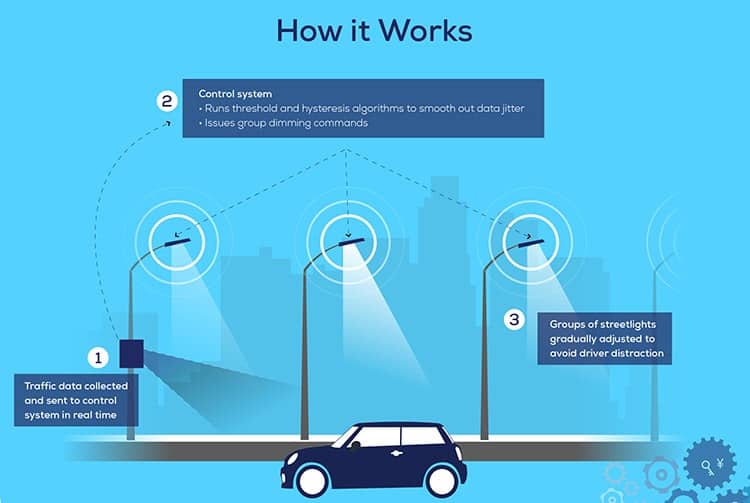
In the case of Telensa, it’s not just about installing energy-saving LEDs that are just fancy motion sensors that turn themselves on or off based on the presence or absence of cars. Telensa’s adaptive street lighting can measure traffic, air quality and more, feeding algorithms that can dim or otherwise react to street-by-street conditions. Typical energy savings sit at around 30 percent. In addition, the system turns streetlights into a smart city hub for other IoT sensors and applications, with a dedicated wireless network. The system has been deployed on more than 1.5 million streetlights across more than 50 cities.
Smart Law Enforcement
While urban legend has it that more streetlights equals more safe streets, the evidence is actually mixed. While some companies hope to leverage AI to predict crime before it even happens, the reality is that violence is random. A public company called ShotSpotter (SSTI) has developed a system that precisely locates gunshots and automatically alerts authorities. The system relies on acoustic sensors placed around buildings or even smart streetlights. The network triangulates the location of the shots and uses machine learning to identify gunfire from other types of noise in the urban jungle. Alerts are then blasted out, even to smartphones. It all happens in less than 60 seconds.
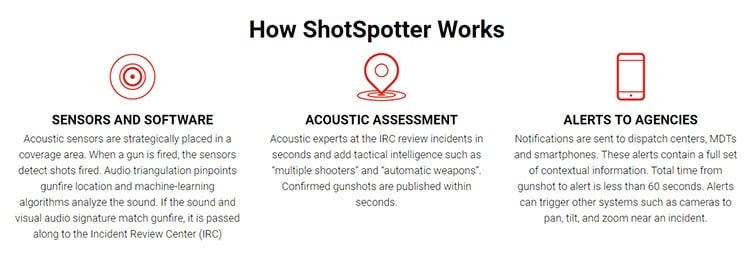
Shotspotter went public last year, after raising about $68 million in capital and another $30 million from an IPO. It has a market cap of about $400 million, while its stock is trading somewhere in the middle of its 52-week range.
Smart Waste Management
More people moving to the big city means more waste is being produced. The world generates about 2 billion tons of garbage, according to the World Bank, with some cities spending up to half of their budgets on managing trash. No wonder startups are trying to reduce food waste or turning to AI to sort through trash.
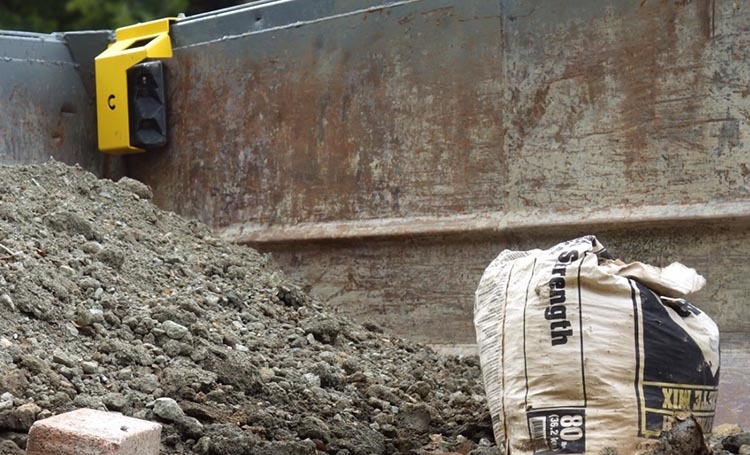
Founded in 2012, San Francisco-based Compology has raised $16.7 million, including a $9.1 million Series B in March, to help cities monitor and manage their waste better. The key technology is a rugged dumpster camera that captures high-resolution photos of the inside of a dumpster, multiple times per day, that measures fullness. The cameras are also equipped with GPS and an accelerometer to determine location and records when a dumpster gets picked up and put down. Compology recently introduced an AI application that can identify if recycling or organic waste has been contaminated with landfill waste. It’s like smart home technology for Oscar the Grouch.
Conclusion
The future city of tomorrow is rapidly taking shape today. One interesting trend is how some of these platforms, such as the one offered by Telensa, have been designed to integrate with a larger IoT ecosystem. Or how Quantela’s Atlantis platform has multiple use cases across a municipality. If 5G can truly deliver on speed and connectivity, we expect smart city technologies could become one of the economic drivers in the coming decades, as aging infrastructure is replaced with smart streets, smart bridges, and smart streetlights. IoT could be a really smart investment.
Sign up to our newsletter to get more of our great research delivered straight to your inbox!
Nanalyze Weekly includes useful insights written by our team of underpaid MBAs, research on new disruptive technology stocks flying under the radar, and summaries of our recent research. Always 100% free.














